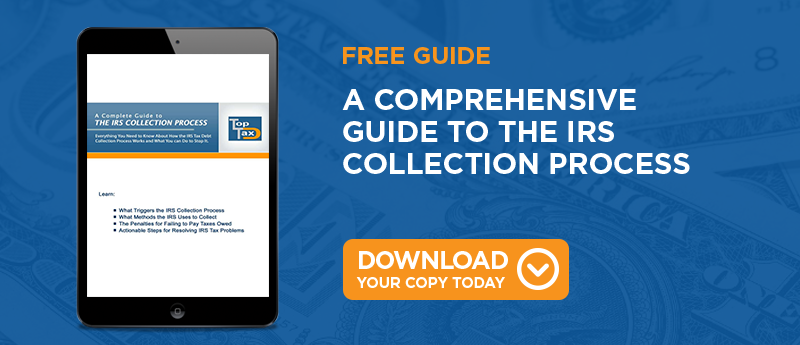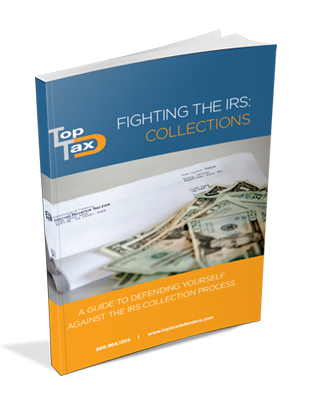Once the IRS places a tax levy on your property, you need to pay in full or suffer the consequences of an IRS asset seizure. Asset seizure means that the IRS will retain ownership of your property, be it your vehicle, house, or other personal property, and will sell it at auction. Proceeds from the sale will go towards settling your tax debt.
>>Click Here For an Overview of the IRS Collections Process
How often does the IRS actually take property? In this video, Top Tax Defenders Director of Operations Priya Mishra explains wage garnishments, what the IRS can take, and how our team can help slow the IRS collections process.
You do have a 30-day window of opportunity after being sent a notice of a tax levy before the IRS can seize your property. If you cannot pay in full, this thirty day period is the time to find a solution to your tax debt problem before your assets are subject to seizure.
What Do We Mean by "Assets?"
When we talk about the IRS seizing assets, which assets are we talking about exactly? When it comes to satisfying the debt you owe to the federal government, the IRS can seize just about any of your belongings that have equity and can be resold for cash, from expensive jewelry you own to investments you have been making to save up for retirement. Money raised from selling your assets is then applied to the tax debt that you owe to the IRS.
What Assets Can the IRS Seize?
In a nutshell, the IRS can seize any asset that you do not need for your basic survival and shelter. Some of the most common assets that are seized and then sold to satisfy tax debts include:
- vehicles, including boats, RVs, cars, and motorcycles
- fine jewelry, especially pieces made from gold, silver, or other precious metals
- second and vacation homes
- retirement accounts
- savings accounts
- life insurance policies
- certain government benefits
- Social Security and survivor's benefit payments (up to 15%)
The IRS does not view these types of assets as critical to you or your family's survival or shelter, and these assets also have enough equity in them that they can be liquidated for their cash value. The goal of seizing assets is to satisfy the debt as quickly as possible since you failed to pay it off yourself.
However, if you owe the IRS under $5000, your assets may not necessarily be seized and sold off. Instead, the IRS will seek to satisfy this smaller amount through other means including garnishing your income and seizing your federal tax refunds.
>>Click Here to Learn More About What Assets the IRS Can Legally Seize
What Assets Can the IRS NOT Seize?
While the IRS has the right to seize a wide variety of assets and sources of income, it cannot legally lay claim to others especially those that you and your family need to survive on a daily basis.
While the agency seems all-powerful, there is still some stuff it can’t have.
- A minimum exemption for salaries and other income
- Worker’s Compensation
- Unemployment benefits
- Certain annuity and pension payments
- Income for court-ordered child support payments
- Certain service-connected disability payments
- Assistance from the Job Training Partnership Act
- Furniture and household items up to a certain amount
- Tools necessary for you to ply your trade, business, or profession up to a certain amount
- Your principal residence unless they meet the requirements above for seizing your home
While the IRS technically has the right to seize sources of income like unemployment benefits and welfare payments, it typically will avoid doing so if these payments are your only source of income.
Finally, the IRS cannot seize any asset that has no equitable value out of spite. If a car or home, for instance, has no value and cannot be sold at auction, it must be left in your possession. Assets that do not have value and can't be sold for cash must be excluded from being seized by the IRS.
>>Click Here to Learn More About What Assets the IRS Cannot Seize
The Seizure Process
The seizure process involves a revenue officer and possibly a judge coming to your home or business to seize your property. The revenue officer can take assets sitting in public areas, including cars parked in front. The revenue officer will request access to the private areas of your home or business. If you consent, the revenue officers enter areas like a garage or house and take any assets there. If you say no when they ask to enter private areas, they will simply come back with a Writ of Entry and you will be required to grant them access. If your home is seized, a notice will be hung on the door.

After seizure, the IRS will calculate a minimum bid price for the property. Real property is set at fair market value. A public auction's time, date, and location are placed in the local paper, and someone buys your belongings. Getting your things back after sale can be quite difficult.
>>Click Here to Learn About What Happens After Your Assets Are Seized
My Assets Have Been Seized. What Now?
The surest way to have your seized assets released back to you is to settle your owed taxes in full with the IRS immediately. If that is not possible, you may also be able to have your assets released if you can show any of the following to be true:
- the assets were seized after the allowed collection period ended
- releasing your seized assets will make it possible for your to pay your owed taxes
- you have set up an installment payment plan and terms of your payment agreement do not allow the seizure to continue
- prove economic hardship, meaning the asset seizure is preventing you from providing for your basic needs
- prove the assets seized by the IRS were much greater in value than the amount owed, and returning your seized assets will not prevent the IRS from collecting what is owed
However, be aware that even if your seized assets are released, that does not mean you're off the hook for the tax debt owed! You will still need to work out payment of your taxes or your assets may just be seized all over again. It is in your best interest to work quickly to settle on a plan with the IRS for how you will pay your owed taxes.
Get Help From Experienced Tax Professionals
If you're facing asset seizure, you don't have to face this alone! Hire a tax firm experienced at working with the IRS. Top Tax Defenders has decades of experience fighting the IRS for their clients. Top Tax Defenders has the knowledge of IRS policy and procedure, and can aggressively pursue a settlement for your tax debt. Contact us today for a free consultation.
>>Click Here to Read Real-Life Success Stories from Our Clients







